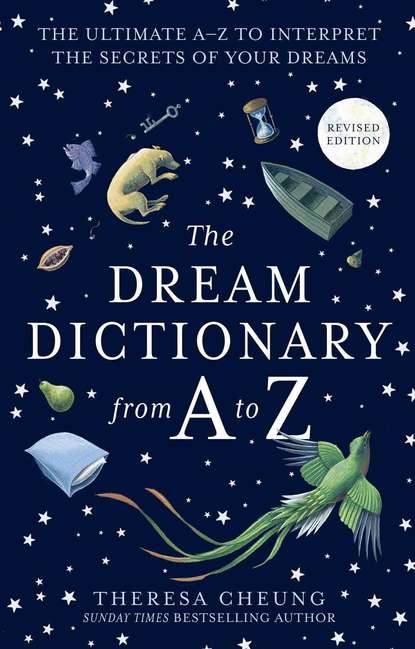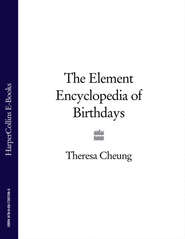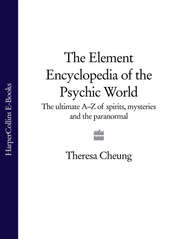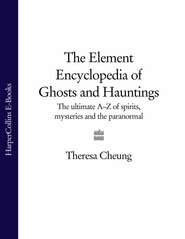По всем вопросам обращайтесь на: info@litportal.ru
(©) 2003-2024.
✖
The Dream Dictionary from A to Z [Revised edition]: The Ultimate A–Z to Interpret the Secrets of Your Dreams
Автор
Год написания книги
2019
Настройки чтения
Размер шрифта
Высота строк
Поля
Genghis Khan is reported to have received his battle plans in dreams. It is also said that a dream told him he was ‘a chosen one’.
Samuel Taylor Coleridge wrote his famous poem ‘Kubla Khan’ after waking from an opium-fueled dream.
Robert Louis Stevenson was convinced his best stories, including the main device in Dr Jekyll and Mr Hyde, came to him in dreams. Suffering as a child from nightmares, he reportedly learned to control his dreams so he would no longer have nightmares. He said his dreams inspired all his writings.
Days before he was assassinated, Abraham Lincoln dreamed of loud wails coming from the East Wing of the White House. When he investigated, he was told by soldiers on guard that they were weeping for the President, who had been assassinated. Days later Lincoln’s body was laid in state in the East Wing so people could pay their last respects.
Friedrich August Kekulé von Stradonitz was a chemist working on the chemical structure of benzene. His data made no sense to him because benzene (we now know) does not behave like a ‘long string’ molecule. While dozing in a comfortable seat, Kekulé saw in a dream the image of a snake biting its own tail. He woke up and immediately understood the mathematics of the benzene molecule – which has a ring rather than a long-string structure.
Italian violinist and composer Giuseppe Tartini composed one of his greatest works, ‘The Devil’s Trill’, after a dream he had in 1713. In the dream he handed his violin to the devil himself, who began
to play with consummate skill a sonata of such exquisite beauty as surpassed the boldest flights of my imagination. I felt enraptured, transported, enchanted; my breath was taken away, and I awoke. Seizing my violin I tried to retain the sounds I had heard. But it was in vain. The piece I then composed…was the best I ever wrote, but how far below the one I heard in my dream!
Elias Howe wrote that he understood the central notion of his invention of the sewing machine in a nightmare in which he was captured by cannibals. While dancing around a fire and preparing to cook him, the cannibals waved their spears. Howe’s dreaming mind noticed that the head of each spear bore a small hole through the shaft. The up-and-down movement of the spears and the hole in each spear remained with him when he woke. The idea of passing thread through a needle close to its tip, and not at its widest point, was a major innovation in making sewing by machine possible.
One night in 1816, Mary Shelley, her husband, and a group of friends were challenged to each write a ghost story. That night Mary dreamed of a creature that would later become the monster created by Victor Frankenstein in her yet-to-be-written novel.
Niels Bohr said that he developed the model of the atom after he had a dream that he was sitting on the sun with all the planets whizzing around him and hanging by the thinnest cords.
Paul McCartney heard a haunting melody in one of his dreams, confirmed that none of the Beatles had heard it before, and wrote it down. It became the tune for the song ‘Yesterday’.
In 1964 golfer Jack Nicklaus told a reporter how his dreams helped him practice and significantly improve his golf swing.
Dream Types
To all, to each, a fair good night. And pleasing dreams and slumbers light.
– Sir Walter Scott
Understanding what type of dream you had can help you to interpret it. Just as there are different types of music – classical, rock, jazz – there are different kinds of dreams. Although dream types can blend and merge, modern dream researchers tend to break dreams down into one of the following categories:
Afterlife Dreams
Dreams about departed loved ones can feel incredibly real and bring tremendous comfort, healing, and reassurance to the dreamer, encouraging them to believe that perhaps in some unseen realm the departed loved one lives on. Psychologists believe such dreams are products of grief, but whether they are or not research has shown that people who dream of departed loved ones tend to deal better with their grief than people who do not.
Amplifying Dreams
These can exaggerate certain situations or life attitudes in order to point them out sharply for the dreamer. For example, someone who is very shy may dream that they have become invisible.
Anticipating Dreams
These are dreams that may alert us to possible outcomes in situations in our waking lives – for example, passing or failing an exam. We dream the most likely scenarios, or what our fears about these situations are.
Auditory Dreams
These are dreams where you recall sounds or hearing something, rather than visual symbols. Many artists and musicians have experienced these kinds of dreams and used what they heard as inspiration for their work. Sometimes the sound you hear may be the sound of a narrator telling you what is happening in the dream. When this occurs your dreaming mind wants you to concentrate on the narrative or story being told. (Be aware that sometimes external noises from your sleeping environment, like a phone ringing, can creep into your dream.)
Cathartic Dreams
Such dreams evoke extremely emotional reactions, when the unconscious is urging us to release pent-up emotions we may feel unable to express in waking life. For example, you may find yourself bursting into tears on a packed commuter train in your dreams, or you might punch your irritating neighbor or tell your boss exactly what you think of them.
Childhood Dreams
Dreaming about your childhood may reflect a childhood dynamic that hasn’t been worked out yet and requires a resolution. It may also suggest a need for greater spontaneity in your waking life.
Contrary or Compensatory Dreams
In these types of dreams, the unconscious places the dreaming self in a totally different situation to the one we find ourselves in waking life. For example, if your day has been filled with unhappiness and stress due to the death of a loved one or the end of a relationship, you may dream of yourself spending a carefree, happy day by the seaside. Your unconscious may also give you personality traits that you haven’t expressed in waking life. For example, if you hate being the center of attention, you may dream about being a celebrity. Such dreams are thought to provide necessary balance, and may also be suggesting to you to incorporate in your waking life some of the characteristics that your dream highlighted.
Daily-processing Dreams
Also known as factual dreams, daily-processing dreams are dreams in which you go over and over things that happened during the day, especially those that were repetitive or forced you to concentrate for long periods – dreaming about a long trip or a tough work assignment, for example. These kinds of dreams don’t tend to be laden with meaning, and most dream theorists think of them as bits and pieces of information your brain is processing.
Daydreaming
There is a big difference between daydreaming and dreams when you are sleeping, even though the physical state we enter when we daydream has much in common with the relaxed state we assume during sleep. However, when you are daydreaming, you are not actually asleep. When you are asleep, your defense mechanisms are down and you are psychologically more vulnerable. In other words, we shed the masks we wear in public. Therefore, what is expressed in dreams (as opposed to daydreams) is probably a better representation of who we are, not just our waking hopes and fears. Those feelings and thoughts we might be unwilling to acknowledge in waking life often surface boldly in dreams. Dreams we have when we are fully asleep also speak to us in the powerful language of symbols, whereas the language of daydreams tends to be more tangible, reflecting events that have a clearer reality to them.
Epic, Cosmic, or Life-changing Dreams
These kinds of dreams are extremely vivid and rich in archetypal symbolism. They are likely to be the dreams that you can’t forget for many years after you have had them. When you wake up you feel that you have learned something profoundly important about yourself. See also 10 COMMON DREAMS YOU SHOULD NEVER IGNORE, here (#litres_trial_promo).
False Awakening
It is thought that many reported sightings of ghosts are caused by false awakenings, which occur when you are actually asleep but are convinced in your dream state that you are awake. This is the kind of vivid dream in which you wake up convinced that what happened in your dream really occurred.
Incubated Dreams
This is when you set your conscious mind on experiencing a particular kind of dream. For example, you may ‘incubate’ a dream of a loved one by concentrating on visualizing your loved one’s face before you sleep, or you may ask for a dream to answer your problems immediately before going to sleep. The theory is that your unconscious responds to the suggestion or request. See also Dream-maker, here (#ulink_4bb74840-6c9c-5c17-84f7-edbc7f7c404f).
Inspirational Dreams
Many great works of art, music, and literature have allegedly been inspired by dreams, when the unconscious brings a creative idea to the fore. For example, English poet and artist William Blake said that his work was inspired by the visions in his dreams.
Lucid Dreams
These occur when you become aware that you are dreaming while you are dreaming. It takes time and practice to stop yourself from waking up, but it is possible to learn how to become a lucid dreamer and control the course of your dreams. See also Dream Catcher, here (#ulink_10b90489-f597-5bc8-87ac-18d89db279de).
Mutual Dreams
This is when two people dream the same dream. Such dreams can be spontaneous or incubated, for example when two people who are close decide on a dream location together and imagine themselves meeting up before going to sleep.
Nightmares
These are dreams that terrify us or cause us distress in some way by waking us up before the situation has resolved. Nightmares occur during REM sleep and typically arise when a person is feeling anxious or helpless in waking life. Once the dreamer has recognized what is triggering this kind of dream, and worked through any unresolved fears and anxieties, nightmares tend to cease.
Night Terrors
These are similar to nightmares, but because they occur in deep sleep (stage four of the sleep cycle) we rarely remember what terrified us, although we may be left with a lingering feeling of unexplained dread.











